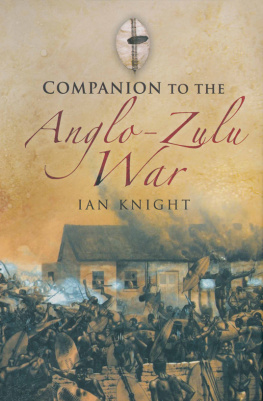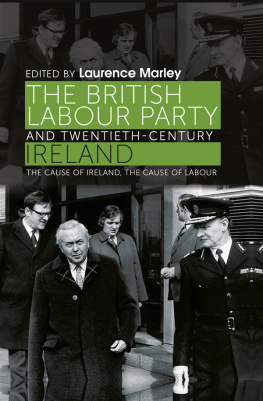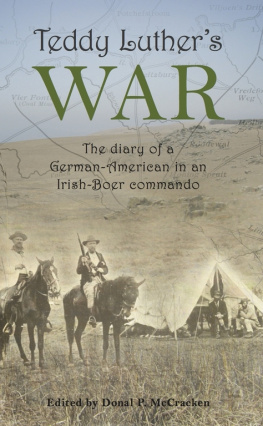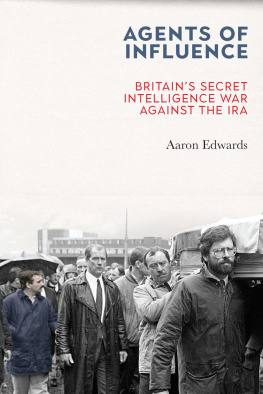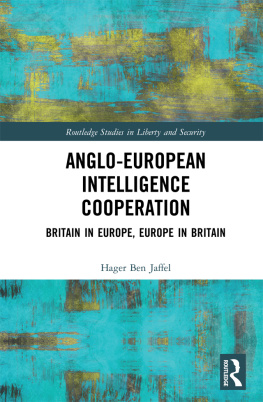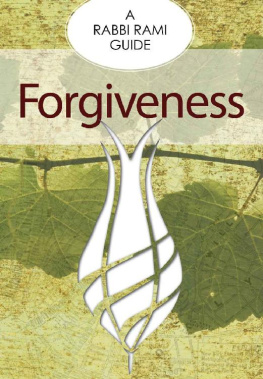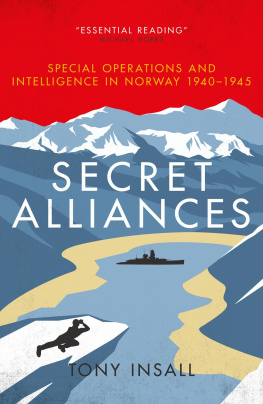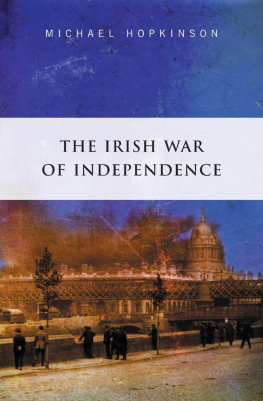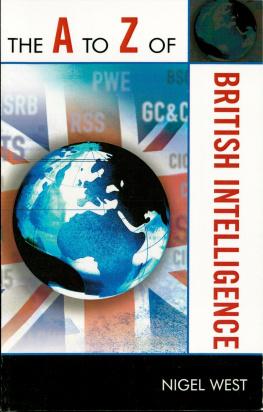Central Washington UniversityScholarWorks@CWU
All Master's Theses Master's Theses
Summer 2016
British Intelligence Operations During the Anglo-Irish War
Elliott N. Reid
Central Washington University, reide@cwu.edu
Follow this and additional works at: https://digitalcommons.cwu.edu/etd

Part of the European History Commons , and the Military History Commons
Recommended Citation
Reid, Elliott N., "British Intelligence Operations During the Anglo-Irish War" (2016). All Master's Theses. 436.
https://digitalcommons.cwu.edu/etd/436
This Thesis is brought to you for free and open access by the Master's Theses at ScholarWorks@CWU. It has been accepted for inclusion in All Master's Theses by an authorized administrator of ScholarWorks@CWU. For more information, please contact scholarworks@cwu.edu.
BRITISH INTELLIGENCE OPERATIONS DURING THE ANGLO-IRISH WARA ThesisPresented toThe Graduate FacultyCentral Washington UniversityIn Partial Fulfillmentof the Requirements for the DegreeMaster of ArtsHistorybyElliott Nigel ReidAugust 2016CENTRAL WASHINGTON UNIVERSITYGraduate StudiesWe hereby approve the thesis ofElliott Nigel ReidCandidate for the degree of Master of Arts________________________________________________________Dr. Jason Knirck, Committee Chair________________________________________________________Dr. Roxanne Easley________________________________________________________Dr. Amanda Link________________________________________________________Dean of Graduate StudiesiABSTRACTBRITISH INTELLIGENCE OPERATIONS DURING THE ANGLO-IRISH WAR
by
Elliott Nigel ReidAugust 2016
This study examines the performance of the British authorities intelligence operationsagainst those of the Irish Republican Army during the years 1919-1921. It is a reassessment ofprevious perceptions on the British as well as an examination of the British administration and itspolicies that adversely affected the success of their campaign against Irish nationalists. Upon itsconclusion, this study will show that British law enforcement and the military were in fact moresuccessful in combating Irish nationalists than previously believed.iiTABLE OF CONTENTSChapterPageiiiCHAPTER IINTRODUCTIONOn 6 December 1921, British and Irish representatives signed the Anglo-Irish Treaty,effectively ending the Anglo-Irish War, or, alternatively, the Irish War of Independence. Just asimportantly, the treaty established of the Irish Free State, a self-governing dominion whichwould in time become the Republic of Ireland. Since the founding of an independent Ireland,scholars who have written about modern Irish history have almost unanimously come to theconclusion that the British, in terms of intelligence and information-gathering activities, werecompletely outmaneuvered by the Irish nationalists. In particular, much has been made of theIrish leader Michael Collins and the intelligence organization which he created and ledthroughout the conflict. Under Collinss leadership, many British intelligence agents and otherswho collected information on the Irish nationalist movement were either forced to resign theirposts due to threats to their lives, or were killed while performing their duties. Perhaps the mostrecognized and well citedexample of the Irish intelligence communitys success against itsBritish adversaries is the killing of many agents connected with the Cairo Gang, a secret Britishintelligence group, on 21 November 1920. On that day, 14 members of the organization werecaught unaware and shot by the Squad, Michael Collinss personal I.R.A. unit tasked withcountering British intelligence by eliminating spies and informers.With notable successes such as this, Michael Collins and Irish intelligence as a wholehave, for quite some time, been firmly recognized as being vastly superior to British intelligencein the historical narrative.1 However, with more in-depth research and closer scrutiny, it can beargued that British intelligence, conducted by both Irish law enforcement and the Britishmilitary, was much more successful in dealing with Irish intelligence and Irish nationalism as awhole than previously realized. In fact, throughout the conflict, combined British intelligenceefforts made great strides in countering the Irish Republican Army and its intelligence system,eliminating some of its best soldiers and agents, collecting information that was detrimental tothe nationalist cause, and to an extent delaying the establishing of the Irish Free State. However,the British government lacked consistent overall policy in intelligence matters. Politicalconsiderations and disagreements exacerbated its inability to provide unified support for itsintelligence community. Indeed, some government policies, such as the release of manyimprisoned nationalists against the advice of those who had been tasked with their detection andcapture, were positively detrimental to intelligence efforts. This thesis will show that Britishintelligence during the Anglo-Irish War deserves a much better reputation than it has beengenerally accorded by historians. Its operations and the successes that were achieved wereremarkable in light of the hindrances and limitations with which it was burdened.The aim of this thesis is not to minimize the achievements of Irish intelligence andMichael Collins during the struggle. It is, rather, to address the short shrift given Britishintelligence by historians who have focused too exclusively on the Irish side of events, and tobring more comprehensive attention to the British narrative.
1Proponents of this view include contemporaries such as Hayden Talbot and Tom Barry, as well as historians like Tim Pat Coogan. Their views will be examined in fuller detail in Chapter Two.
The first of the following three chapters will examine the historiography of the
intelligence war in Ireland and how it has gradually changed in recent decades. Utilizingprimary sources written by participants of the war and acquaintances of Michael Collins, as wellas biographies and works written after the event, it will be seen that through much of theprevious century the British intelligence community has been overshadowed largely by thelegend of Michael Collins, the unofficial director of Irish intelligence and later head of the FreeState government. Even before his death in 1922, Collins has been seen as the mastermindbehind Irish intelligence, and his personality and exploits have hampered a more in-depthanalysis of intelligence operations as a whole. To a certain extent, the works of Irish intelligenceofficers working with or independently from Collins, as well as historians who have writtenabout them, have done much the same thing. In the majority of these works the British and theirintelligence activities are generally only mentioned in passing. Where more description of themis given, they are often depicted in a negative light. Only in recent decades have scholars startedto show a more genuine interest in and a less critical view of these participants, yet as will beshown their evaluations are still in need of expansion.The second chapter will provide an overview of the history of British intelligence,specifically from the time of the Napoleonic Wars. Supported primarily by secondary works,this chapter will show that it took the British administration nearly a century filled with trial anderror to finally establish and maintain an intelligence community that would operate both withinand outside of the empire. However much progress as was achieved in the creation of a moremodern system in England and foreign nations, little of this progress was extended to Britishadministration in Ireland. Racial and cultural biases, as well as the assumption that the policeforces already established in Ireland were sufficient to gauge any subversive activity or discontent, led the government to believe that a greater commitment to intelligence efforts on theisland was unnecessary, and professionalism made the R.I.C.s efforts seem amateurish.The final chapter will address actual events of the intelligence war throughout the officialyears of the conflict, 1919-1921. Using a combination of primary sources that include memoirsand autobiographies from British and Irish Republican Army veterans as well as recordedwitness statements from the latter, Cabinet documents, contemporary newspaper articles, and thepersonal papers of Richard Mulcahy, it will relate the measures taken by the British, theobstacles that had to be overcome, and the extent to which intelligence operations weresuccessful. It will argue that such victories as were to be had were due to the high quality ofBritish intelligence personnel, organization, and procedures.CHAPTER IIHISTORIOGRAPHYAlthough the Anglo-Irish War has been little researched in comparison to the many otherconflicts that were waged around the world during the twentieth-century, certain aspects andsubjects from the conflict have garnered considerably more attention than have others, not leastof which was the information or intelligence war waged between republicans seeking anindependent Ireland and the British administration. Without a doubt, scholars have arguedalmost unanimously that the Irish Republican Army outwitted and outmaneuvered the Britishand their unionist counterparts, who seemed to underestimate their opponents and failed tosuccessfully defeat physical force republicans. Be that as it may, many historians vary in theirassertions as to why this was so, how structured Irish intelligence really was, and who is to becredited with the campaigns success.Additionally, while the wide body of scholarship generally promotes the view that theBritish were, militarily speaking and in terms of policing, completely overwhelmed and did notfully grasp the predicament in which they found themselves, a number of scholars have recentlyput forth new arguments that challenge this general perception, among them Peter Hart, CharlesTownshend and W.H. Kautt. Examining the written records of those who participated or wereassociated with the conflict, one even finds instances of pessimism and doubt among Irishnationalists concerning their intelligence capabilities. Looking both at works written during theperiod by the combatants, as well as the scholarship of generations of historians, what has chieflybeen examined are two aspects: Michael Collins himself and the ability of the Irish Republican Army to conduct intelligence operations. These two aspects have, arguably, overshadowed amore in-depth analysis of British intelligence. Yet upon closer examination one finds glimpsesof a more coherent British strategy that is just recently coming under more careful scrutiny.To begin with, no analysis of the subject would be complete without examining thehistoriography of the Big Fellow, Michael Collins, the man appointed by the Volunteerexecutive to be Director of Intelligence and the first Commander-in-Chief of the Free StateArmy. Nor would one be able to view the subject without noting his subordinates. Though onlyone man, he has come to be seen as the most prominent figure of the revolution. To many bothwithin academia and without, Michael Collins was the mastermind behind the IRAs clandestineoperations and successful assassinations. Even before his assassination at Bal na mBlth on 22August 1922, Collins reputation and legendary character were being embellished by suchjournalists as the American Hayden Talbot, who began writing
Next page 
 Part of the European History Commons , and the Military History Commons
Part of the European History Commons , and the Military History Commons 
